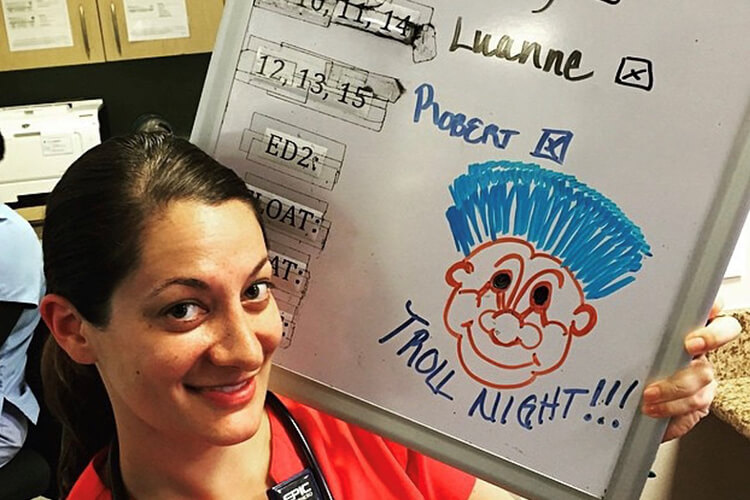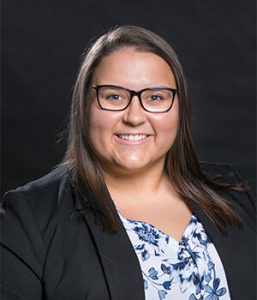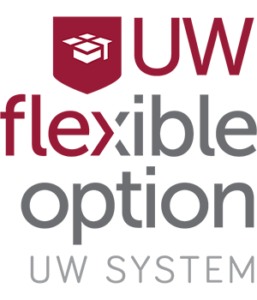RN to BS in Nursing BS
The UW-Milwaukee RN to BSN program is designed for nurses looking to attain their Bachelor’s in Nursing. The program is intended for nurses with a diploma or associate degree and prelicensure ADN students (in final year of ADN program) looking for a flexible way to earn a baccalaureate degree.
The program supports educational mobility and strengthens professional growth and leadership competencies while building interprofessional relationships with healthcare professionals. Students may choose from two modalities to complete their BS in Nursing.
Program Type
Major
Program Format
Online
What makes our program distinguished?
Our program consists of one curriculum delivered in two modes: online or the UW-FLEX Option. Students have the option to enroll full time or part time. Graduates of the Wisconsin Technical College System can earn a minimum of 60 credits applied toward their degree.
The baccalaureate degree program in nursing at UW-Milwaukee is accredited by the Commission on Collegiate Nursing Education (http://www.ccneaccreditation.org). The program is also approved by the State of Wisconsin Board of Nursing.
The UW-Milwaukee School of Nursing offers a program that understands the needs of busy professionals. We provide two flexible learning modes for students to complete the RN to BSN program. This flexibility allows students to adapt their learning to their unique learning style and life needs. We offer online and competency-based assessments. Prelicensure Associate Degree in Nursing (ADN) students in the final year of their ADN program can also request permission to enroll in courses as special students. Special students may take courses to satisfy the requirements for BSN completion.
Learn about both RN to BSN programs now by viewing the virtual information session recording.

BSN@Home
Earn your degree online through the UW-System Collaborative Nursing Programs: BSN@Home.

FLEX: UW Flexible Option
Students complete competency-based assessments in place of the traditional course structure to show mastery of a subject. Learn more about this kind of competency-based, self-paced learning option at flex.wisconsin.edu.
UWM and MATC Partnership
The UWM School of Nursing and MATC School of Health Sciences offer collaborative programs that lead to both an associate degree in nursing (ADN) and the baccalaureate degree in nursing (BS-Nursing). Options include ADN to BSN, 3+1, or direct admit programs. Additionally, prelicensure ADN students may enroll as special students.
Admission Requirements
- ADN or Nursing Diploma
- 2.5 College GPA (on a 4.0 scale)
- Current unencumbered RN license in any state OR currently enrolled in an Associate Degree in Nursing (ADN) program.
Enrolled or Planning to Enroll in an ADN Program?
Students who are currently pursuing their Associate Degree in Nursing (ADN) and in their final year of the ADN program are able to take courses as a special student to fulfill the general education and nursing courses for the RN to BSN degree (see below).
Course Requirements
The academic plan is tailored to you to fulfill 121 credits to degree completion including non-nursing courses, ADN courses, and advanced nursing courses.
See Curriculum
ADN courses or state credit for prior learning?
We provide an opportunity to award our RN to BSN students for work they have already completed within their ADN program and other advanced nursing courses. Students may be awarded up to 30 credits from their ADN nursing courses through our longstanding Wisconsin Technical System (WCTS) agreement. The WCTS Articulation Agreement applies to ADN graduates of May 1996 or later.
Special Students
RN to BSN special students are non-degree students who are:
- Currently enrolled in the final year of an Associate Degree in Nursing (ADN) program
- Read more about information regarding Special Students
Upon completion of your ADN, you will:
- Take the NCLEX exam
- Obtain an unencumbered nursing license
- Apply and be admitted to the RN to BSN program
Course Requirements: 124 credits
Our advising team will meet with you to discuss a personally tailored academic plan based off of previous credits completed and additional required credits needing to be completed. Our team is able to provide you with an unofficial transcript review to determine which requirements you may need to complete.
| Non-Nursing Courses | 52-61 Credits |
|---|---|
| English 102 | 3 cr |
| Humanities | 3-6 cr |
| Arts | 0-3 cr |
| Social Sciences: Sociology (3) Psychology (3) | 6 cr |
| Growth and Development | 3 cr |
| Natural Sciences: Chemistry (3) Biochemistry (or Pharmacology, Pathophysiology, Physics, Biology, Genetics, or Heredity) (3) Anatomy & Physiology (6-8) Microbiology (3) Nutrition (2-3) | 21 cr |
| Electives | 19-25 cr |
| Advanced Nursing Courses | Course Number | 30 credits |
|---|---|---|
| Foundations of Professional Nursing Practice* | 407 | 3 |
| Chronic Care Management* | 441 | 3 |
| Research & Evidence-Based Practice* | 446 | 3 |
| Leadership & Management* | 447 | 3 |
| Information Management & Healthcare Technology* | 453 | 3 |
| Community Health Nursing* | 454 | 3 |
| Capstone Seminar and Practicum* | 445 | 3 |
| Nursing Electives | 9 |
Previous Nursing Credits
30 nursing credits are awarded to students when the advanced nursing courses above (*) are completed with a grade of C or higher. Students are awarded the additional 30 credits from the longstanding Wisconsin Technical College System (WTCS) agreement. The WCTS Articulation Agreement for A.D.N. graduates of May 1996 or later will have a total of 30 credits from these areas applied to the UWM degree.
Other Requirements
Some RN to BSN students may need to fulfill UWM requirements in the areas of cultural diversity, foreign language, math competency and english competency. These additional requirements and an overall program plan can be discussed with our academic advising team.
- Cultural Diversity – Required for students starting UWM Fall 1989 or later
- Foreign Language – Required for students starting college Fall 1999 or later
- Math Competency – Math 102, 103, 105, 108 or equivalent
- English Competency – English 102 or equivalent
Every RN to BS Program student will complete NURS 445 Capstone Practicum for RNs. The program is designed to schedule your capstone as your final course in the program. NURS 445 can occur in any setting where capstone students can engage in quality improvement (QI) while maintaining the professional standards of nursing. Students focus their capstone QI project on a realistic topic pertinent to their nursing practice setting. Students will engage in the QI process to promote improved safety, quality, and outcomes in the nursing practice setting. The settings in which students complete the capstone are varied, primarily focusing on the nurse’s role within QI. Most complete capstone at their current place of employment, fostering employee engagement while implementing real-world changes in practice.
The baccalaureate degree program in nursing at UW-Milwaukee is accredited by the Commission on Collegiate Nursing Education. CCNE requires that all students in RN to BS programs have a clinical component to their degree program to enable them to apply and integrate new knowledge in a clinical setting. Students spend at least 60 hours on the capstone QI project.
For additional information regarding capstone please review the Frequently Asked Questions. Students will begin planning for capstone the semester prior to enrolling in capstone.
Other Resources
Experiential Learning
- Last course in the program
- Consists of theory and clinical application
- Non-direct care with focus on Quality Improvement (QI) project
- Hands-on experience performing QI
Employee Engagement
- Immersion to Practice at the workplace
- In your employee role
- Collaboration with the healthcare team
- Self-initiated and directed
- Meet with leadership and discuss potential project topics.
- Focus is to develop, implement, and evaluate an evidence-based quality improvement project that meets a need of the QI Project site.
- All course assessments are designed to evaluate a student’s demonstration of the course competencies through their work on their QI Project.
- You are encouraged to complete most of the QI Project work at the QI Project site to engage with key stakeholders to actively design, implement, and evaluate their QI Project.
- Students will dedicate time off the unit as appropriate to their QI Project, such as completing literature searches, analyzing data, and connecting with key stakeholders.
- The scope of the QI Project will be defined through collaboration among you and key stakeholders.
- The purpose of the clinical project is twofold:
- To meet a need at the QI Project site to support patient care or nursing pratice.
- To integrate and demonstrate skills learned in previous courses, including needs assessment, data collection, implementation, evaluation, quality improvement, research-based literature searches, evidence-based practice, management, and leadership principles.
Use evidence-based practice and best practices to guide the work and improve outcomes.
- Reinforcing, re-educating, introducing, development of:
- Sepsis protocol and bundle
- Massive transfusion protocol
- Falls prevention
- Bedside handoff
- HAI prevention
- Debriefing Huddles
- OR Timeouts
- Use of a new device or supply
- Narcan use in the public
- Education
- Actively part of creating and implementing skills fair
- Creating a simulation
- Updating education to reflect current best practices
- Quality Review/Quality Assurance to apply and implement changes in practice
- Conducting chart audits
- Investigation of a Root Cause Analysis (RCA)
- Reviewing data and trends
- Statewide BSN@Home Program Coordinator
- Program Manager
- forbes@uwm.edu
- Cunningham Hall 129A
BSN@Home Frequently Asked Questions for N445
- How many clinical hours must I complete?
UWM School of Nursing RN to BS Nursing program requires students to complete 60 clinical hours. The clinical hours can be spent collaborating with your preceptor, other key stakeholders, attending meetings, gathering data and information for your QI project. - When do I need to begin the process to prepare to take NURS 445 Capstone Course?
We suggest that students begin preparing for capstone at least one full semester ahead of the date you wish to enroll in the N445 Capstone course. This allows students to complete all forms and documentation required for the clinical onboarding process at your desired clinical setting. - How much time will it take to complete the preparation process?
For most students, it will take approximately 4-8 weeks. It will depend on what is required by your clinical agency or health care system. Students will want to find out what is expected by their clinical agency. - When are all requirements due so that I may enroll in NURS 445 Capstone Course?
All documents and requirements are due at a minimum of 60 days prior to enrollment in the NURS 445 Capstone Course. The due dates are provided for each document that needs to be uploaded to canvas. - What is the clinical project?
The clinical capstone project is focused on quality improvement. It is meant to be a project that meets the needs of the agency and attempts to improve the outcomes of care in that agency. You will need to work with your preceptor to determine the most appropriate clinical project for your site. - Do I need to find my own clinical setting or will UWM School of Nursing do that?
Students are highly encouraged to complete their project at their place of employment. Please start discussions with your manager and student clinical placement office. Students who are unemployed or in a setting without a qualified preceptor are encouraged to find their own preceptor and clinical site. We can assist and guide students in finding a preceptor and clinical setting. - Can I complete my clinical hours in a setting where I am currently employed?
Yes- we strongly encourage students to complete their clinical hours in the agency or system where they are currently employed. Past students have found that completing their project in their own workplace is much more successful than trying to do this in a new setting. - Do I need to have a preceptor?
Yes – a nurse preceptor prepared at the BSN level or above (BSN, MSN, CNL or DNP) is required. Nurses prepared at the associate degree level only are not eligible to be a preceptor. MDs are also not eligible to be preceptors. - Does UWM School of Nursing need to have a formal agreement with my clinical setting?
Although we do not require a formal affiliation agreement with your setting, many settings do require this. UWM needs to have an affiliation or a letter of agreement with the agency or health care system you are completing your clinical hours in. UWM has existing education contracts with many health care systems, agencies, and institutions in the metropolitan Milwaukee area. If you live outside the Milwaukee area, we may be able to help to facilitate a contract with the agency you wish to use for your clinical hours.
It may require additional time to attempt to pursue a contract if we do not have a current contract with your preferred clinical agency. Contracts are usually facilitated by the education liaison or nursing leadership office in a clinical agency. If the agency or health care system you are planning to do your clinical hours in requires an affiliation agreement, please plan accordingly as this can take anywhere from 4-10 weeks to complete. To initiate and gather further information reach out to the RN-BSN Program Director. - Do I need to take time off work to complete clinical hours?
Most students work full time while completing their clinical capstone hours. Clinical hours may be completed at whatever time is negotiated between the student and preceptor. Students may elect to take time off in order to complete clinical hours. - Who should I contact if I have questions?
Please direct your questions to academic affairs (advisor) or the RN to BS Canvas Orientation Site.
More specific questions can be directed as follows:
Nicole Simonson DNP, RN
Director of RN to BSN Completion Program
nms@uwm.edu, 414-229-5235
Sonya Sharp
Clinical Capstone Placement Coordinator:
sharps@uwm.edu, 414-229-6188
Mike Walk
Castlebranch Coordinator and Nursing Academic Affairs Office: walk@uwm.edu
RN to BSN Completion Frequently Asked Questions for NURS 445
- How many hours must I complete?
UWM School of Nursing RN to BS Nursing program does not outline a required number of hours. The hours to complete capstone are contingent on what is required to effectively complete steps of a QI project. However, students tend to spend at minimum 60 hours on various components of the quality improvement project. The hours can be spent collaborating with your preceptor, other key stakeholders, attending meetings, gathering data and information for your QI project. - When do I need to begin the process to prepare to take NURS 445 Capstone Course?
We suggest that students begin preparing for capstone at least 3 months ahead of the date you wish to enroll in the N445 Capstone course. This allows students to complete all forms and documentation required for the l onboarding process at your desired nurse practice setting. - How much time will it take to complete the preparation process?
For most students, it will take approximately 4-8 weeks. It will depend on what opportunities are available at your nurse practice setting and key stakeholders you need to connect with prior to starting. It is best that students connect with their direct leader to discuss the focus of the QI project on non-direct patient care. - When are all requirements due so that I may enroll in NURS 445 Capstone Course?
All documents and requirements are due at a minimum of 30 days prior to enrollment in the NURS 445 Capstone Course. The due dates are provided for each document that needs to be uploaded to canvas. - What is the quality improvement project?
The quality improvement project is focused on a topic in the nurse practice setting that may need to be addressed. It is meant to be a project that meets the needs of the agency and attempts to improve the outcomes of care in that agency. You will need to work with your direct leader to determine the most appropriate project for your site. - Do I need to find my own nursing practice setting or will UWM School of Nursing do that?
Students are highly encouraged to complete their project at their place of employment. Please start discussions with your direct leader regarding this non-direct patient care experience. Students who are unemployed or in a setting without support resources are encouraged to find their own nurse practice setting. We can assist and guide students in finding a setting that is appropriate to complete capstone. - Can I complete my hours in a setting where I am currently employed?
Yes- we strongly encourage students to complete their hours in the agency or system where they are currently employed. Past students have found that completing their project in their own workplace is much more successful than trying to do this in a new setting. - Do I need to have a preceptor or mentor?
Students are not required to have a preceptor. However, it may be to their advantage to have a mentor prepared at the BSN level or above (BSN, MSN, CNL or DNP). A mentor can help guide and support students through the QI process and use of the QI model. - Do I need to take time off work to complete hours?
Most students work full time while completing their capstone hours. Hours may be completed at whatever time is negotiated between the student and direct leader. Students may elect to take time off in order to complete their quality improvement project and hours. - Who should I contact if I have questions?
Please direct your questions to the success coach or the RN to BS Canvas Orientation Site.
More specific questions can be directed as follows:
Nicole Simonson DNP, RN
Director of RN to BSN Completion Program
nms@uwm.edu, 414-229-5235





